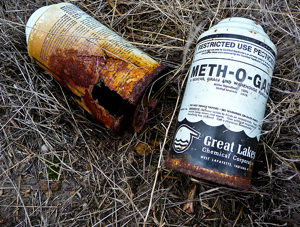Unaddressed Concerns Over a Pesticide
In 2006, more than 50 scientists and doctors -- five nobel laureates among them -- wrote an urgent letter to the EPA warning of the dangers of the pesticide methyl iodide. In 2007, the agency approved its use. (more)
In 2006, more than 50 scientists and doctors — five nobel laureates among them — wrote an urgent letter to the EPA warning of the dangers of the pesticide methyl iodide. In 2007, the agency approved its use.
According to Pesticide Action Network, a group opposed to the use of methyl iodide, exposure to the substance “causes late term miscarriages, contaminates groundwater and is so reliably carcinogenic that it’s used to create cancer cells in laboratories,” posing a serious threat to farmworkers and those who live near treated fields. A panel of independent scientists convened by the state of California concluded that exposure would be “difficult, if not impossible” to prevent.
So why is methyl iodide now approved for use? The chemical was initially welcomed as a savior to the agricultural industry. Years ago the EPA saw it as an alternative to another pesticide, methyl bromide, which was barred because it depleted the ozone layer. As for the controversy that has followed, look to the revolving door between industry and regulatory agencies. –ARK
Your support matters…Mother Jones:
The US government’s official opinion on methyl bromide has been: We can’t fully ban it until we find a suitable alternative. And the agrichemical industry has been scrambling to find a Montreal Pact-friendly alternative for years.
Here’s where we get back to methyl iodide. In 2006, the Japanese chemical giant Arysta presented it to the EPA as the perfect candidate to replace methyl bromide. The pitch: It works just as well on nematodes, but it doesn’t harm the ozone layer. As for farmworkers, well…
Arysta had friends in high places while the EPA pondered methyl iodide: In 2006, then-EPA director Stephen Johnson appointed Elin Miller, then-CEO of the North American arm of Arysta, to a high post within the agency. Before her stint at Arysta, Miller had worked at Dow Chemical, “overseeing the company’s public affairs, global pest management, and Asia Pacific operations,” according to an an EPA press release.
Independent journalism is under threat and overshadowed by heavily funded mainstream media.
You can help level the playing field. Become a member.
Your tax-deductible contribution keeps us digging beneath the headlines to give you thought-provoking, investigative reporting and analysis that unearths what's really happening- without compromise.
Give today to support our courageous, independent journalists.






You need to be a supporter to comment.
There are currently no responses to this article.
Be the first to respond.